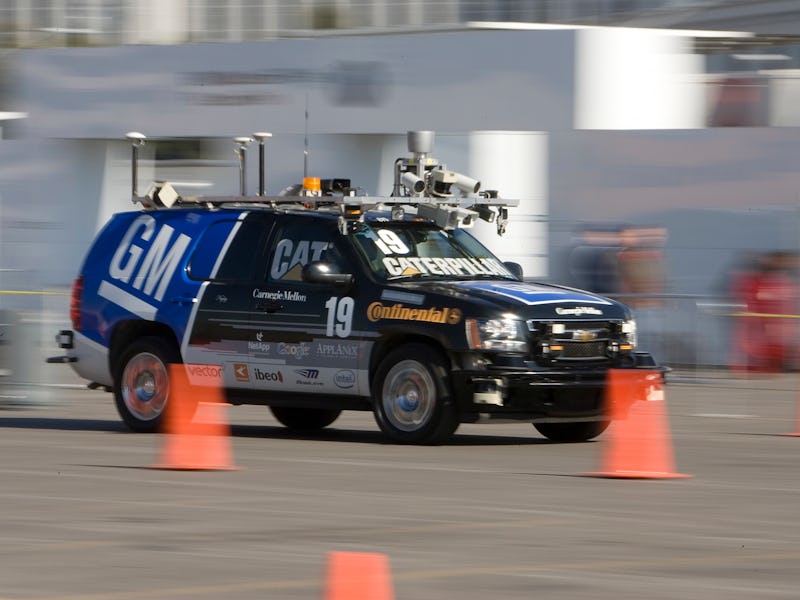8 of the Auto Industry's Most Compelling Acquisitions
Car companies and technology companies are becoming one and the same.

The race to create driverless cars is crowded with expensive acquisitions and high-profile partnerships.
It’s seen traditional automakers join with tech companies to develop autonomous vehicles, and the partnerships have hit a high over the past couple of years. This is happening just as manufacturers and developers have begun to see where the future of transportation lies.
A new concept of overall mobility has blurred the lines between car manufacturer and technology company. Tesla is one of the most visible examples of a vehicle manufacturer that is just as much a technology company, and Google started advancing autonomous technology before many car companies put skin in the game.
1. Toyota and Jaybridge Robotics
Jaybridge Robotics, a 16-person A.I. software firm started at the Massachusetts Institute of Technology, announced that it had been acquired by Toyota in March. It joins the Toyota Research Institute, which has a five-year, $1 billion budget to advance the company’s autonomous development, led by former DARPA program manager Gill Pratt.
Jaybridge started seven years ago with a focus on creating A.I. software for industrial work like agriculture and mining. Jeremy Brown, Jaybridge’s CEO, said in a statement in March that the team is looking forward to “going after the big one: helping to reduce the nearly 1.25 million traffic fatalities each year, worldwide.”
GM and Lyft will put autonomous Chevy Bolts on the road in 2017.
2. General Motors and Cruise
Autonomous technology darling Cruise Automation joined GM’s Autonomous Vehicle Development team in San Francisco in March. It cost GM $1 billion to bring Cruise in.
The purchase was just one of several power moves GM has recently made. Earlier in 2016, GM invested $500 million in ride-hail company Lyft, and the two companies have made it known that they are working on a fleet of autonomous vehicles. The companies plan to roll out app-summoned autonomous Chevy Bolt’s in 2017.
3. Tesla and Mando and Mobileye
Tesla’s Autopilot is arguably the most advanced autonomous system on the road today. The company claims to gather data on around a million miles a day as well, so development is moving quickly.
Tesla has relied on Mobileye, an Israeli company, for much of the development up to this point. Of course, Tesla’s semi-autonomous technology hasn’t come without incident. Tesla is attempting to bridge the gap with a partnership with the Mando Corporation for a “fail-safe” autonomous system.
NuTonomy wants to put driverless taxis in Singapore by 2018.
4. Fontinalis and nuTonomy
Fontinalis, a venture capital firm founded by Ford chairman Bill Ford, is a big fan of autonomous car company nuTonomy. Fontinalis has invested millions of dollars in nuTonomy twice now, and it’s clear why — nuTonomy’s goal is to put autonomous taxis on the streets of Singapore by 2018.
Fontinalis makes it clear that the company is not a part of Ford despite Bill Ford’s involvement. But it also “only invests in next-generation mobility opportunities,” which sounds pretty similar to the Ford Smart Mobility LLC subsidiary Ford announced this year. Which such close ties, it’s not hard to imagine that Ford is closely watching what nuTonomy is up to.
Apple hasn't confirmed it is making a car, but the company's hires suggest otherwise.
5. Apple and Chris Porritt
Apple and Tesla have a habit of swapping employees — so much so that Elon Musk called Apple the “Tesla graveyard.”
One of the most notable is Apple’s hire of former Tesla vice president of vehicle engineering Chris Porritt for “special projects.” The “special project” might be Apple’s Project Titan, which has been kept under wraps. More and more evidence points to Apple wanting to get in the autonomous car game, and Porritt’s hire gives Apple a guy who knows how to engineer a car with style.
Apple also recently announced a $1 billion investment in Chinese rideshare company Didi Chuxing.
Uber's Ford Fusion.
6. Uber and Carnegie Mellon University
Uber announced a “strategic partnership” in February 2015 with CMU for the Uber Advanced Technologies Center in Pittsburgh. The partnership was created as a way for Uber developers to work with faculty and students at CMU’s prestigious National Robotics Engineering Center for “mapping and vehicle safety and autonomy technology.”
Uber has since hired away 40 of CMU’s top researchers and put an autonomously modified Ford Fusion on the roads.
Nissan recently showed off it's technology to G7 leaders.
7. Nissan and NASA
In January 2015, Nissan and NASA announced a five-year research partnership to focus on “autonomous drive systems, human-machine interface solutions, network-enabled applications, and software analysis and verification.” It’s a win-win for both: Nissan gets some government backing and NASA gets some corporate-funded technology for autonomous rovers.
“The work of NASA and Nissan — with one directed to space and the other directed to earth, is connected by similar challenges,” Carlos Ghosn, president and CEO of Nissan, said in a statement at the time. “The partnership will accelerate Nissan’s development of safe, secure and reliable autonomous drive technology that we will progressively introduce to consumers beginning in 2016 up to 2020.”
8. BMW and Baidu
BMW partnered with the leading Chinese search engine company Baidu in 2014. The goal was to produce a semi-autonomous prototype by the end of 2015, and sure enough, they did it.
In December 2015, a 3-Series BMW whipped around an 18.6 mile road in Beijing.
All of this shows that autonomous technology is coming sooner rather than later — now public perception just has to catch up to the hype in the auto industry.